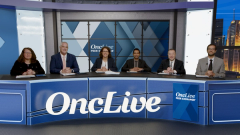
Treatment Options for Stage I-IIIA NSCLC
After a brief introduction, Lyudmila Bazhenova, MD reviews treatment options for early-stage NSCLC, the prevalence of EGFR mutations, and guidelines for managing patients with stage 1b resectable disease.
Episodes in this series

Dr. Zofia Piotrowska: Hello, and welcome to this OncLive Peer Exchange entitled eGFR Mutant Non-Small Cell Lung Cancer: Expert Perspectives in Testing and Targeted Therapy. I'm Dr. Zofia Piotrowska, and I'm joined today by a panel of experts in the field of lung cancer. I would like to welcome my esteemed fellow panelist to introduce themselves.
Dr. Lyudmila Bazhenova: Hi, I'm Dr. Lyuda Bazhenova, a thoracic medical oncologist from the University of California, San Diego.
Dr. Nicholas Rohs: Hi, I'm Nick Rohs from Mount Sinai Hospital in New York City.
Dr. Ashish Saxena: Hi, I'm Dr. Ashish Saxena from Weill Cornell Medicine, Meyer Cancer Center, also in New York City.
Dr. Jay Moon Lee: Hello, Jay Lee, UCLA Thoracic Surgery.
Dr. Gustavo Cumbo-Nacheli: I'm Gus Cumbo-Nacheli. I'm an interventional pulmonologist at Michigan State Corewell.
Dr. Zofia Piotrowska: Welcome everyone, and thank you so much for joining me today. Today we're going to discuss a number of updates in resectable and advanced non-small cell lung cancer. We'll discuss the data in the context of national guidelines, the treatment landscape, and most importantly, its impact on clinical practice. So, with that, let's get started with our first topic. So, we're going to talk first about resectable early-stage non-small cell lung cancer today. This year, we've seen a number of exciting developments and advances in early-stage disease, and I'm really excited to cover this topic. Lyuda, maybe we can ask you to start, and just give us a little bit of an overview of how you think about early-stage, stage one to three A, non-small cell lung cancer. And because today, one of our focuses is going to be on eGFR-mutant lung cancer, maybe a little bit also about what we know about the prevalence of eGFR mutations in this population.
Dr. Lyudmila Bazhenova: I think the first decision point we all have when we are dealing with patients with early-stage lung cancer is to determine if the patient is resectable or not. And that is determined generally not by us but by surgeons and many pieces of information go into that decision. Is the tumor resectable surgically? What's the whole situation? Does the patient have comorbidities that prevent him from having surgery? And then, once the surgery is performed, if surgery is appropriate, then that's where we come in as a medical oncologist because we need to make decisions on adjuvant therapy, and we need to know, do we do adjuvant therapy. What kind of adjuvant therapy are we going to do? And since our talk today is on the patients with eGFR mutation, I think it's important for us to know how often we see those patients. And your likelihood to have seen the patient depends on where you practice. So, if you practice in Asia, you're probably going to see a lot of Asian never-smoking females, and you're likelihood of finding any eGFR mutation would be probably around 50%. In the United States and in Europe, the incidence of eGFR mutations is much lower, usually about 10 to 20%.
Dr. Zofia Piotrowska: I think we used to think about, maybe, eGFR mutations as not as relevant for early-stage disease, that it was something that we really only thought about and acted upon an advanced disease. And I think that's really changed so dramatically in the past couple of years.



































